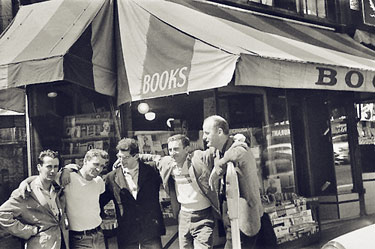 James Lackington
James Lackington
Via blog.seattlepi: "James Lackington was the most successful bookseller of the 18th century.
His legendary shop at Finsbury Square in London was named 'The Temple of the Muses' and when the flag was raised on the huge dome outside it meant Lackington was inside and ready to do business. Lackington revolutionized the book trade by becoming the first bookseller to refuse to sell books on credit. His cash only approach allowed him to offer books less expensively. Lackington also refused to destroy or discard remaindered books and instead sold them at bargain prices for Lackington firmly believed 'that books were the key to knowledge, reason and happiness and that everyone, no matter their economic background, social class or gender, had the right to access books at cheap prices.'"
(For the full article, click here.) Lawrence Ferlinghetti
Lawrence Ferlinghetti
Via: BeatMuseum.org: "Born in New York, Lawrence Ferlinghetti earned a doctoral degree in poetry at the Sorbonne in Paris with a dissertation entitled 'The City as Symbol in Modern Poetry: In Search of a Metropolitan Tradition'. In fact he was about to become part of a metropolitan tradition himself, because after leaving Paris he moved to San Francisco, which was about to discover the Beat Generation. Ferlinghetti and Peter Martin started a magazine there called 'City Lights,' named after the Charlie Chaplin movie. He and Martin established their offices on the second floor of a building on Broadway and Columbus in North Beach. They decided to open a bookstore on the floor below as a side venture, naming it after the magazine. The City Lights Bookstore became one of the most famous bookstores in the world, and still stands proudly in its original location. Doing double-time as a businessman and a poet, he began publishing original books by himself and others under the City Lights name, most notably the 'Pocket Poets Series.' The idea of Pocket Poets was to make poetry books easily affordable, and the small attractive paperback volumes are still a common sight today. Ferlinghetti published Allen Ginsberg's 'Howl' as Pocket Poets Number Four, and was tried on obscenity charges for this. He was declared innocent, a landmark victory for free speech."
(For the full article, click here.) You
You
Born sometime in the last century, you grew up loving books and naively thought that working as a bookseller wouldn't really be like working at all. After all, you'd be surrounded by that which you love most and interacting with folks with a similar passion -- getting paid would just be the icing on the cake! Silly you. This is the same mistake that nymphomaniacs make when they get jobs in the glory hole business. How long did it take you to realize that most of your customers would not be deeply devoted lovers of literature, but best seller/new release whores and self-published writers asking you to buy their books? Still, you pressed on. You dreamed of the day when you would open your own bookstore, pushing aside common sense and an economy that whispered warnings to the contrary. When the local indie you worked at went bankrupt, you didn't despair. You simply crossed the street and filled out an application at the Borders/Barnes & Noble that put them out of business. You weren't being a traitor. Not exactly. You always wanted to work in a bookstore and this was the only option available. So you suffered through annoying add-on sales, unreasonable seasonal sales goals, and illogical corporate mandates, all the while trying to convince yourself that a 10% discount made it all worthwhile. Now you've got frown lines, grey hairs (in your eyebrows!), and your friends and family are afraid to ask you how your day went, lest they be treated to the same Madlibs-variety tirade* that they've heard from you a hundred times before. But hey -- you're bookselling! In a bookstore! Just like you'd always dreamed!
*"I had this (curse word ending in 'ing') customer today who called me an (curse word, singular) when I told them that (obscure book from a college press) has been out of print for (number over ten) years. Then , when I told them I could try and order them a used copy, they told me they'd get it on (online bookselling bohemoth)."
Thursday, January 17, 2008
Spotlight On: Legendary Booksellers
Posted by
Inkwell Bookstore
at
12:10 AM
![]()
Labels: book news, bookselling



